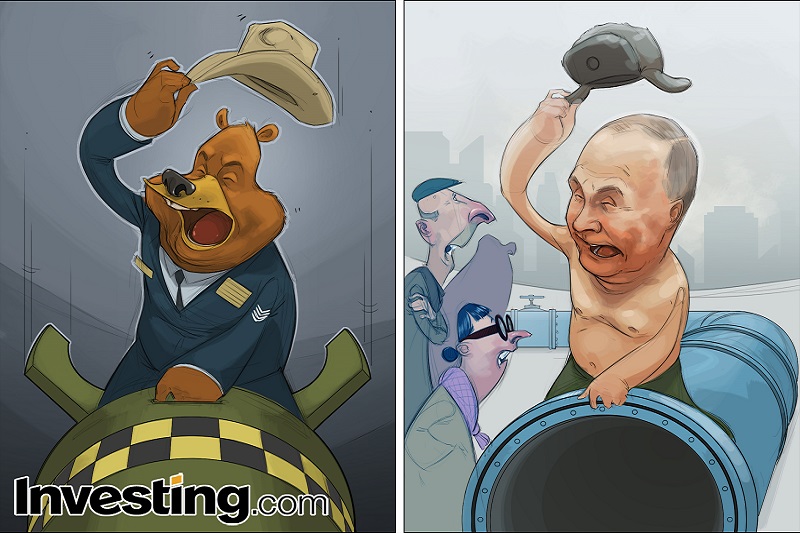By Geoffrey Smith
Investing.com -- Russia is on the verge of invading a European neighbor for the third time in 14 years. Unlike the last two, this one could have a real economic impact. In August 2008, it hardly mattered to the global economy that Russia had invaded Georgia. Oil prices were rapidly collapsing, but the world was much more concerned with the collapse of the U.S. financial system.
In February 2014, when Russia invaded Ukraine, annexing the Crimean peninsula and establishing two puppet statelets in the east of the country, the West noticed enough to impose some sanctions but hardly enough to move the dial.
Then, as now, the risks of applying a suitable punishment for the most naked piece of aggression in Europe since World War 2 were serious enough to inhibit a convincing response. Threats to cut Russian banks out of the international payments system SWIFT were quickly dropped when the U.S. realized that that might hasten the end of the dollar’s dominance of global financial markets. And a European Union still wrestling with the after-effects of a sovereign debt crisis was in no state of mind to punish the Russian ruling class by selling it less liquor, cars and luxury goods.
European economic vulnerability is again at the heart of the problem today. Only this time, it is more acute: unless the continent can draw quickly on additional supplies of Russian natural gas, it will almost certainly have to impose rationing by the end of the winter. As household supplies will be given priority in such circumstances, it is industrial energy users who will be forced to shut down - as they were, effectively, by the quadrupling of spot market prices last year when the current crisis began to unfold.
All this is possible because Europe’s gas storage facilities are at their lowest on record for this time of the winter, at only 46.8% full according to data from industry association Gas Infrastructure Europe. Normally it takes until mid- to late-February for the usual seasonal drawdowns to reach that level.
Russia is holding back all but the bare minimum in gas from its European customers until Germany gives its final approval to the Nord Stream 2 pipeline. That new link that could quickly and easily release the squeeze on European gas markets that has driven short-dated futures up four-fold in the last year.
However, Germany’s new government – and especially its Foreign Minister, Annalena Baerbock – is less beholden to German industry than the previous one under Angela Merkel. And while Baerbock herself told a press conference that Russia gas will be needed for years to come while Germany transitions to cleaner energy, many of her Green party colleagues don’t want the pipeline commissioned at all. For them, higher energy prices are a valuable tool to force fossil fuel buyers to carry climate change costs that so far have been defrayed onto insurers and taxpayers.
After the hit to industrial production, there will be second-round effects, both on consumer spending and on corporate balance sheets. Governments across Europe are already running scared of the massive increase in household energy bills coming down the line. Over the weekend, French President ordered Electricite de France to sell more of its power at a sharp discount to market rates. EDF's (PA:EDF) stock fell over 23%, its biggest one-day drop ever. In the U.K., the lifting of an energy price cap in April threatens to finish off what popular support there is for Boris Johnson’s government among the less well-off voters who put it into power.
In Italy, which imports nearly all of its fossil fuel energy, Mario Draghi’s government has already spent around 8 billion euros on subsidizing household energy costs since July and is now planning to hit energy companies with higher taxes. The country’s budget deficit may still widen by another 30 billion euros as the country tries to cushion the impact, according to Matteo Salvini, head of the right-wing Lega party.
Spain’s Socialist government is also planning clawbacks from the energy and utility sector, but the risk across the Eurozone is that a soft patch for growth and a sharp rise in energy subsidies blow a fresh hole in public finances. A year ago, no-one would have batted an eye about that, because the European Central Bank was willing to buy all the net debt issued by Eurozone states. But today, with inflation at an all-time high of over 5%, that seems less certain.
The ECB has said it’s likely to start reducing its bond purchases from April and that no interest rate hikes will be needed this year. But bond markets are already betting that – like the Federal Reserve – it will be forced into tightening monetary policy faster than it expects in order to rein in inflation.
That sets the stage for a noisy debate in Frankfurt over the next couple of months that will send reverberations through bond, credit and stock markets. All those who, like Dr. Strangelove, have learned to stop worrying over the last two years may – like the great scientist himself – may yet discover they were mistaken to do so.
